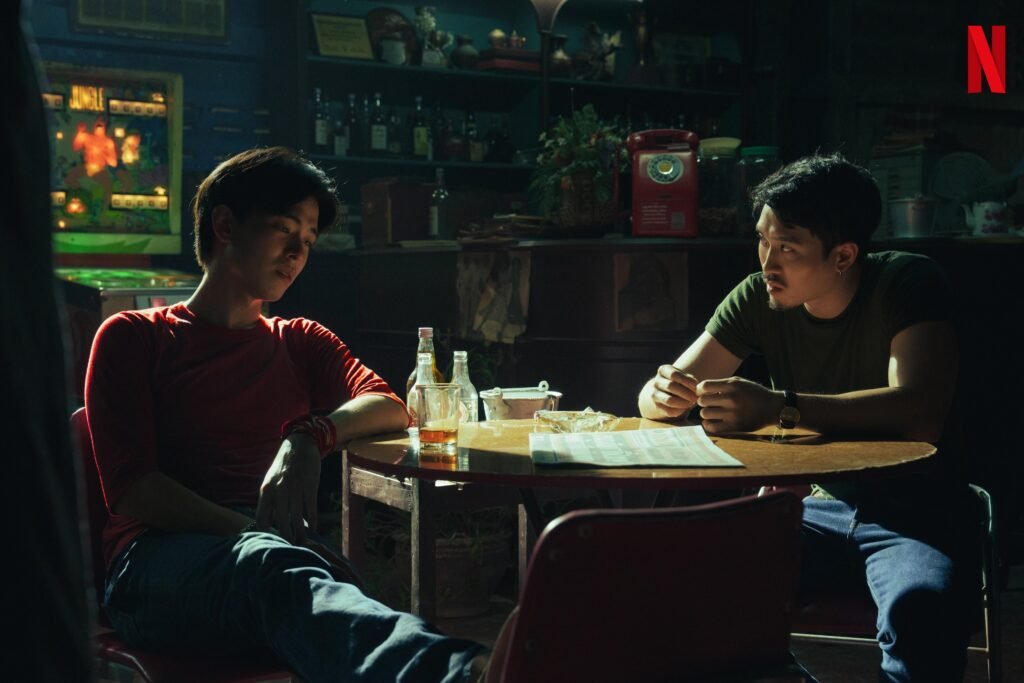Tee Yai: Born To Be Bad Review

Director: Nonzee Nimibutr
Date Created: 2025-11-14 01:35
3.5
Tee Yai: Born To Be Bad Review: Helmed by Nonzee Nimibutr, ตี๋ใหญ่ ฤกษ์ดาวโจร breathes new life into one of Thailand’s most famous outlaw legends with freshness and cinematic polish. In the lead role, Apo Nattawin Wattanagitiphat plays charming, yet wholly unreliable, criminal Tee Yai, whose name sends ripples through 1980s Bangkok. Most Witsarut Himmarat plays Rerk, his steadfast friend, while Joke Akarin Akaranithimetrad plays Jakarat, a tough-as-nails detective who is determined to bring him down. The nearly two-hour series also stars Kao Supassara Thanachart, Nont Sadanont Durongkavarojana and others.
Tee Yai: Born To Be Bad Review
Netflix’s Tee Yai: Born To Be Bad is a story set in a magnificently re-created 1980s Bangkok, where we follow Tee and Rerk as they commit daring robberies, manage to escape, and gradually, through mythic and magical ways, mix with the public, building their image of a mix of superstition, loyalty, and survival. People start to think that Tee has been endowed with the gift of invisibility. In addition to magically causing rain, Tee is, for some, a modern-day legendary figure, while for others, a nuisance not to be taken lightly. But behind the gunfire and chase, there is an unexpectedly touching narrative of friendship and sacrifice that we will eventually discover.

The combination of the action and the story makes the visuals extraordinary, as we go from the bustling streets of Bangkok to the smoky black-market lodging; you feel as if you are right there in the midst of the liveliness. The period of the ’80s is well depicted through the professionals’ excellent production design, and all the while, the lighting and music create the dramatic moments of tension that keep you alert throughout.
The film captures the era well in many respects, but there are moments where its digital clarity makes it feel too contemporary, eroding the time period illusion. However, that is a small price to pay to maintain how consistently good the film looks throughout. For a Netflix movie, it seems large, ambitious and proudly Thai, a combination of grime, style and heart which most local films avoid.

Undoubtedly, Tee Yai Rerk Dao Jone has a heart in Apo Nattawin. Known globally for KinnPorsche, he fully sheds his persona here. He represents Tee Yai as a mystery and as a man riddled with his own demons, and his beautifully sculpted moustache and just as confident smirk and piercing gaze do not help–it completes the illusion. Instead of keeping Tee as a one-note criminal, he fleshes Tee out as a real character, a man who is aware that he is breaking laws but cannot escape the world that created him.
Also Read: Last Samurai Standing Review: Fierce and Emotional Survival Game That’s Deeply Entertaining to Watch
Most Witsarut Himmarat as Rerk provides the perfect counterbalance. If Tee is fiery and impulsive, then Rerk is calm and rational. The friendship they share feels genuine, even brotherly, so this makes the film’s outcome hard to digest in the third act. It’s the emotional beats between them that transform this Thai movie Tee Yai: Born To Be Bad, into more than just your run-of-the-mill crime drama, and you realise that sooner rather than later.

What I really appreciated about Tee Yai Born To Be Bad is how it reads as thrilling but avoids romanticising crime. Every step that Tee and Rerk take comes at a cost, a physical and emotional cost that the film hammers back into consciousness. They are not perfect heroes either, nor are the police, especially Jakarat. The characters in this story, none are not all without flaws; gold, right and wrong are not simple and neat ideals that motivate by.
It’s this kind of moral grey zone that lends the film some emotional weight. It becomes difficult to figure out who you are rooting for. You occasionally feel for Tee’s plight; you also occasionally understand the cop’s desire to get such a weasel into handcuffs. In the end, you come to understand that Tee Yai: Born To Be Bad is not about who wins or loses, as with all Netflix films, but rather the price of loyalty and the toll on freedom.

However, the film isn’t without its faults. The pacing can be a bit jarring at points, particularly in the middle section. They may have cut a few sequences to keep the tension taut. The film hit an emotional stride late with some side characters, such as Dao, feeling merely functional as a plot catalyst. At other times, the editing seems a bit too fast-paced in the action sequences, detracting from the emotional buildup.
Those criticisms, though, are merely dips in an otherwise rounded narrative. The final 30 minutes unleash the best performances from all the actors, no one more so than Apo and Witsarut, who superbly highlight that despite it all, this is as much about crime as it is about redemption, about regret and what it means to be loyal when everything is going wrong.
The thing I liked most about this Tee Yai: Born To Be Bad film was how honest it was. It does not try to be bigger than life or too sappy. At times rough, at times stylish, but most of all, it just feels real. You can feel the blended intention the director went for in terms of creating on-screen relations between Thai folklore and modern real-life. Mysticism, perhaps best represented in Tee’s alleged “magic,” is not merely for flair; it’s a reflection of how fear and admiration spawn legends just as easily as stories themselves.

The film also has this subdued melancholia throughout it. Tee’s world is violent, but he’s not doing this for monetary gain; he’s doing this to survive and because of loyalty. And that emotional undercurrent lifts Netflix’s Tee Yai: Born To Be Bad beyond a mere shootout-driven gangster film. A crime thriller can need to be full of excitement, but beneath everything, it is a character study.
Netflix Tee Yai Born To Be Bad Review: Summing Up
Overall, the Thai movie Tee Yai: Born To Be Bad is far from perfect; however, it leaves a mark. It is distinguished by its performances, direction, and moral complexity. At times, it falters in emotionally sustaining confidence, but the payoff, atmosphere, and Apo himself are enough on their own for it to be worthy of your time watching it play out to the end. This is not simply a tale of a burglar; it is a tale of fellowship, belief, and the myths you hear when you try and explain the disorder around you.
Also Read: Had I Not Seen the Sun Review: Beautifully Broken Reflection on Love and Consequence
